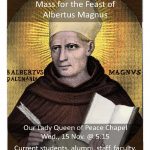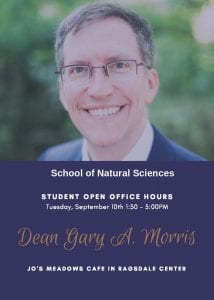Dean Morris will be at Jo’s Meadows Cafe in Ragsdale tomorrow. All are welcome to come chat with him and bring any ideas or concerns. Hope to see you there!
Category Archives: Faculty News
Dean Chairs Session at 2018 National Air Quality Conference
The U.S. Environmental Protection Agency (EPA), the National Association of Clean Air Agencies (NACAA), and the Association of Air Pollution Control Agencies (AAPCA) jointly sponsored this national conference on air quality in Austin, Texas, January 24 – 26, 2018. The meeting brings together representatives from air quality management agencies, scientists, instrument companies, and other stakeholders to discuss the latest resources in air quality and plan for the future.
The conference was originally scheduled to take place September 11 – 13, 2017, but in the wake of Hurricane Harvey, it was rescheduled for this month.
Dr. Gary A. Morris, Dean of Natural Sciences at St. Edward’s, was invited to chair a session: “Case Studies, Data Analysis, and Modeling Tools.” His research group also presented a poster at the conference on “More than a Decade of Ozone Profile Measurements in Texas Using Weather Balloons.”
Pictured below are Dr. Morris (left) with two of his former students: Daniel Alrick (center, now with the Air Quality Management District in San Francisco, a presenter in his session above) and Mark Spychala (right, currently a research assistant in Dr. Morris’ group at SEU).
Mass for the Feast of Albertus Magnus
Gallery

This gallery contains 1 photo.
The School of Natural Sciences invites you to join us for the Mass for the Feast of Albertus Magnus. We hope to see everyone on Wednesday, November 15th at 5:15 PM at Our Lady Queen of Peace Chapel!
SEU at STIx
In August 2017, the Department of Defense Basic Research Office hosted their first-ever Science, Technology & Innovation Exchange (STIx). This event which brought together speakers to address three major topics:
- The big question that my research seeks to answer
- The big question that my technology addresses
- The big question of identifying, nurturing, recruiting, and/or retaining top STEM talent
Assistant Professor of Chemistry Dr. Raychelle Burks was invited to speak on topic #3. She spoke about how she integrated to federally funding programs – one by the National Science Foundation and another by the U.S. Army – to recruit, train, and retain students to her research group. Her talk can be viewed in its entirety below and other STIx talks can be found here.
2017 Lucian Symposium Schedule – Friday, 29 September
From the 2017 Lucian Professor and Chair of Chemistry, Dr. Tricia Shepherd:
This week Friday, the Lucian Symposium will be held in Carter Auditorium beginning at 8:50 am. You can find details on the Lucian Symposium website: https://sites.stedwards.edu/lucian/. The Lucian Symposium is an annual event, open to the public.
Lunch follows the keynote speakers. After lunch, student research posters will be available for viewing in the halls of the John Brooks Williams North Building from 1:30 – 3:30 pm.
There will be four keynote speakers:
- Thomas E. Cheatham, Professor of Medicinal Chemistry & Director of the Center for High Performance Computing at the University of Utah
- Michelle M. Francl, Professor and Chair of Chemistry at Bryn Mawr College
- Ward Thompson, Professor of Chemistry at the University of Kansas
- Garritt Tucker, Assistant Professor of Mechanical Engineering at Colorado School of Mines (http://inside.mines.edu/Garritt-Tucker)
While there will be a common thread among speakers in terms of the using various computational methods in their research, the application/connections with undergraduates in each Natural Science discipline was my goal for the symposium. In particular, the presentations will be broadly applicable as follows: Cheatham: Biology/Computer Science, Francl: Mathematics, Thompson:Chemistry, Tucker:Physics/Engineering. I have advised all the speakers to include background/context appropriate for a broad audience of majors that span the Natural Sciences. Below is the schedule with tentative titles:
Friday, Sept 29th
8:50 am welcome
9:00-9:45 Garritt Tucker: Exploring the Nanoscale Mechanisms of Functional Materials with Computational Materials Science
9:45-10:30 Ward Thompson: The Big Deal about Being Small: Dynamics and Spectroscopy in Nanopores
10:30-10:45 break
10:45-11:30 Michelle Francl: Tools for predicting and understanding molecular structure from paper and pencil to Beowulf clusters
11:30-12:15 Tom Cheatham: Optimizing the use of computers to understand the complexity of biomolecular systems
12:15-1:30 lunch
1:30-3:30 poster session
I appreciate your support of this annual event for our school!
Thanks,
Tricia
Tricia Shepherd, PhD
Chemistry Professor & Dept. Chair
St. Edward’s University
2017 Lucian Symposium and Poster Session
Dear colleagues and students,
A reminder to students that if you did research ANYWHERE this past summer and would like to present a poster on that work as part of the student poster session following this year’s Lucian Symposium (Friday, 29 September), here are the deadlines:
Students who would like to present a poster will need to submit their abstract and title by Noon, Friday, 15 September. To submit your abstract, visit https://cmt3.research.microsoft.com/LS2017 and click the “Registration” tab or “Create Account” link. Once registered, you will receive an activation link and can then access the “2017 Lucian Symposium” conference. To enter your research information, from the home page click the “Create new submission” link. Note: if the conference is not visible from your home page when you log in, click the “All Conferences” tab then enter “2017 Lucian Symposium” in the filter search field and click the title once it is visible.
This year, we are again using Spoonflower to print fabric posters for each student so we will need extra time to allow for the print process. Submit your poster print request in PPT or PDF format as soon as you are able but absolutely no later than 10 am on Thursday, 14 September. Submit your requests to NSCI Poster Print Request.
Each student may have one poster printed by the School of Natural Sciences each academic year. Additional poster printing should be paid for by research grant accounts as appropriate. Students should use the poster they print for all appropriate conference presentations during the 2017 – 2018 academic year. The poster template can be accessed through Box: NSCI Poster Template.
NOTE: posters submitted after 10 am on Thursday, 14 September will not be printed by the School of Natural Sciences. I recommend that if you need to print your poster after that date, please look for poster printing services at local area businesses (e.g., FedEx print).
We are asking students to hang their posters by 3:00 pm on Thursday, 28 September. That afternoon, the School of Natural Sciences Advisory Board will meet. Members of the board often enjoy reading through student posters. They will have time to do so after their meeting concludes around 4:30 pm that afternoon.
We ask students to take their posters down by 5 pm on Friday, 29 September.
We ask students to plan to be at their posters for some portion of the time period 1.30-3.30pm on Friday, 29 September. It is not necessary to stand at your poster for the entire period of time, but do commit to spending some portion of that period of time at your poster if at all possible.
Last year’s event was a tremendous success, and with our prestigious visitors on campus (both for the Advisory Board meeting and for the Lucian Symposium), we have a great opportunity to share what our students have been doing in the area of research and the successes you all are having in advancing the frontiers of science.
Remember, it is not essential that the research occurred at St. Edward’s— any REU or other university research program at which you did research this summer is eligible for a printing of one poster.
Finally – if you were a recipient of a Brother Romard research grant this past summer, the expectation is that you will print out and present a poster at this event.
If you have any questions, please contact NSCIdean@stedwards.edu.
Looking forward to another great student research poster session.
Chemistry Faculty Member Attends IUPAC
Assistant Professor of Chemistry Raychelle Burks was invited to attend the International Union of Pure and Applied Chemistry (IUPAC) 2017 49th General Assembly in Sao Paolo, Brazil 9 – 14 July 2017 as one of the Young Observers selected by the U.S. National Committee of the National Academy of Science for IUPAC. Dr. Burks was one of only 8 young scientists selected as part of a national competition.
Dr. Burks also secured travel funding to support her attendance from the Central Texas Chapter of the American Chemical Society and from the ACS International Activities office.
Congratulations to Dr. Burks. We look forward to hearing about your travels and what you learned at the conference!
Chemistry Professor Featured in Discover Magazine
First-year Assistant Professor of Chemistry Raychelle Burks was recently identified in a Discover Magazine story entitled, “The Heroes of Science” as one of the “Science Stars of the next generation.” The list of “Heroes” includes Jane Goodall, Stephen Hawking, Neil deGrasse Tyson, and Carl Sagan — pretty good company, indeed! Congrats to Dr. Burks!
CS Professor Michael Kart Recognized at 2016-2017 Distinguished Teaching Award Winner
Congratulations to yet another in a series of well-deserved teaching award winners from the School of Natural Sciences. This year, Prof. Michael Kart of Computer Sciences has won the Distinguished Teaching Award. Quoting from the letter:
“The Distinguished Teaching Award Committee was impressed by your thoughtful and pedagogically rich teaching materials, and they equally admired your engaging work in the classroom.”
Dr. Kart will receive his award at the Faculty Recognition Ceremony at 4 pm on April 27 in the Mabee Ballrooms. Please make sure to congratulate him next time you see him.
Hilltop chemist has a cool job
For the 2016 World Science Festival (WSF), I was invited to share why being a chemist and chemistry educator is a cool job alongside forensic anthropologist Angelique Corthals, engineer Erick Ordoñez, and technologist Rachel Rothman. Cool Jobs is a WSF event aimed at inspiring future scientists and the 2016 event hosted approximately 500 attendees – mostly families with young children. Below is a recording of this Cool Jobs event, where I got to kick-off the show by sharing what got me into science, cracking The Great Cookie Mystery, and debunking the Death Star!


